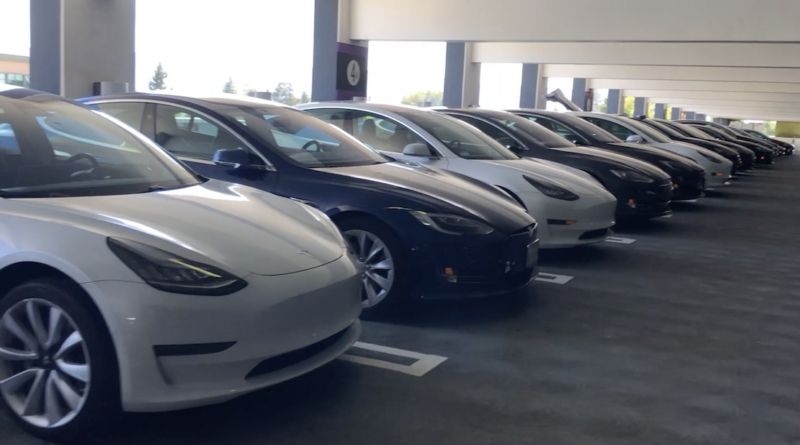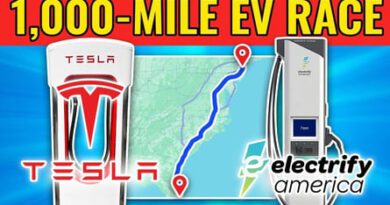2023: Majority of Newly Registered Cars in Germany will be Battery Electric
This September showed that electric cars have finally arrived in Germany. With a 17.1% share of new registrations, one sixth of all newly registered cars are electric. And the growth rates are phenomenal. We are currently seeing a doubling of the share in less than a year. While in September three years ago, just 1.18% of all new registrations were pure battery electric vehicles, one year later the figure was already 2.4%. In September 2020, the figure exploded to an 8% share.
The reason for the acceleration was the COVID crisis, which led to a halt in production at traditional manufacturers and, a few months later, to problems with the resumption of production, which did not affect electric car manufacturers like Tesla, or affected them only mildly. Thus, the chip shortage this triggered became a decision issue: should we put existing chips into electric cars or internal combustion engines? Companies largely opted for the former. Demand for electric cars was higher than for internal combustion cars, and for the first time Ford had built more electric Mach-E than Mustangs.
With these growth rates, the chip shortage that will continue for a few more months, the specter of fuel shortages due to the driver shortage we are seeing in the UK post BREXIT, the generous state and regional subsidies for electric cars, and not to mention the superior driving experience of an electric car, will sustain this trend. And all this in a global car market that is currently experiencing slumps – due to the chimp shortage. For example, German newspaper Handelsblatt estimates up to 11 million fewer cars will be manufactured in 2021, which means a quarter fewer vehicles than in the past. This leads to the paradoxical fact that manufacturers are currently making high profits because they are installing the existing chips in the higher-priced vehicles with high profit margins and, above all, selling them. This currently gives them a feeling of inviolability, but this will only last in the short term.
At the same time, the range of electric cars is becoming more and more plentiful. Tesla, for example, is about to start production with its factory in Berlin-Grünheide. Volkswagen is also working rapidly to convert its factories to produce electric cars, as are other manufacturers. With a steadily growing charging station network still plagued by birth pangs, more and more drivers are experiencing electric cars and becoming convinced. Nine out of ten electric car owners can no longer imagine ever buying a combustion engine again.
Forecast
If we extrapolate the trend in new registrations, then with such doubling rates of less than 12 months, the majority of all newly registered vehicles in Germany will be electric vehicles as early as 2023. Both diesel and gasoline engines, and plug-in hybrids will decline and disappear from the market. By 2025, we are talking about shares of over 80% of new registrations.
Projection of the share of electric vehicles in new registrations in Germany
Here are the numbers used in the chart and the number sources.
Month / YearPercentage of Newly Registered EVsGrowth rate09/20181.18%09/20192.4%103%09/20208.0%233%09/202117.1%114%09/202234.2%09/202368.2%Projection of the share of electric vehicles in new registrations in Germany
Similar registration figures and trends can be seen in Switzerland and Austria. Norway, the pioneering country in terms of electromobility, shows where things are headed. In September 2021, the share of battery electric vehicles reached 77.5%. Plug-in hybrids still account for 13.9%, but are on the decline. Gasoline vehicles are at 3% and diesel at 2.3% (source). If the trend continues as before, the last gasoline and diesel vehicles will be sold in Norway in April.
Impact on manufacturers and others
A report from Wolfsburg proved just how much roof is on the fire. VW CEO Herbert Diess gathers 120 of his top executives to make clear the urgency of change. The growth of electric car sales, software problems with the group’s flagship ID.3 and ID.4 electric cars, manufacturing efficiencies with the Tesla Model 3, which is made in 10 hours while a VW Golf takes more than three times that time, and Tesla’s accompanying cost efficiencies are all bothering Volkswagen.
FUTURE ANGST
Welche aktuellen Ängste prägen uns? Mit welchen Ängsten waren die Menschen in der Vergangenheit konfrontiert, als es die heutigen Technologien noch nicht gab? Warum mischen wir heute im Wettbewerb der Kulturen um neue Technologien nicht ganz vorne mit? Welche Maßnahmen müssen wir ergreifen, um neue Technologien nicht als etwas Beängstigendes und Feindseliges zu betrachten, sondern als ein Mittel zur Lösung der großen Probleme der Menschheit?
Ab sofort erhältlich im Buchhandel, beim Verlag und bei Amazon.
Traditional manufacturers still have to cross-subsidize their electric cars expensively through revenues from combustion vehicles. They are too inexperienced in electric car production and have not yet undergone the iterations of manufacturing optimization that Tesla has. Also, the delayed entry into electric car production led to a simultaneous run on the few previously tapped and thus scarce raw material resources that are needed for battery production, among other things. With the old structures and processes in purchasing and the suppliers, an own goal has been scored with the chip shortage, which first has to be solved and then positioned differently. Not to mention the many newcomers offering electric cars, such as Nio or Lucid, who are entering the market.
If, as predicted, sales of internal combustion vehicles suddenly collapse, then at the critical moment there will be a lack of funds to make the necessary investments in converting production and setting up new battery production facilities, for example, and to cross-subsidize the company’s own electric cars at a competitive price.
The time remaining to make the switch and change supply on the basis of the changed market conditions is getting shorter and shorter. By 2023 at the latest, when the majority of new registrations will be electric cars, the moment of truth will strike. Which of the manufacturers will make it, which of them will struggle with losses?
However, there is no time to rest. Just as predictions about the growth of electric cars were laughed at in 2017, we will be facing autonomous cars in 2021. And traditional manufacturers are even less prepared for this and believe even less in it. But that’s another challenge and the subject of other articles.
This article was also published in German.


